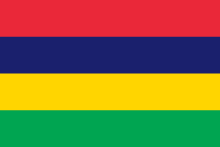- Home
- Member States
- Mauritius

Mauritius has 852MW installed capacity for electricity generation. In 2022, 80.8% of the electricity was generated from non-renewable energy sources comprising mainly fuel oil (49.2%), coal (31.5%) and kerosene (0.1%). The remaining 19.2% electricity was generated from renewable energy sources comprising bagasse (9.1%), solar PV (5.0%), hydro (4.1%), landfill gas (0.6%) and wind (0.5%). The Central Electricity Board (CEB) produced 53.7% of the total electricity generated and the Independent Power Producers (IPPs) produced the remaining 46.3%.
The CEB, operating under the aegis of the Ministry of Energy and Public Utilities, is solely responsible for the transmission, distribution, and sale of electricity in Mauritius and adopts an integrated planning approach for the electricity sector. The Energy Efficiency Management Office (EEMO) was set up as the national regulator for energy efficiency matters and is responsible for the promotion of energy efficiency as a means of reducing carbon emissions and protect the environment. Mauritius has taken the commitment to reduce its greenhouse gas emissions by 40% by 2030 and 10% is expected from energy efficiency gains (from baseline of 2019) and is under the lead of the EEMO. The Mauritius Renewable Energy Agency (MARENA) is responsible for the promotion of renewable energy technologies and for facilitating the decarbonisation of the energy sector with set targets of phasing out of coal by 2030 for electricity generation and increasing the share of renewables in the electricity mix to 60% by same horizon. The Utility Regulatory Authority (URA), which is a member of the Regional Energy Regulators Association, was launched in 2016 and has the role to regulate the utility services including the electricity sector.
The Ministry of Energy and Public Utilities is the National Focal Institution for SACREEE, and MARENA and EEMO are sectoral focal institutions for Renewable Energy and Energy Efficiency matters respectively.
Access to electricity in Mauritius is 99.7% in both urban and rural areas.
